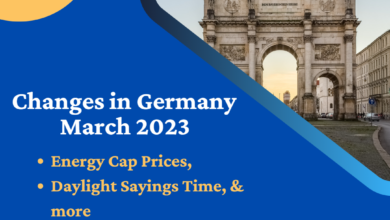Germany’s Skilled Worker Law for Fast-Track Permanent Residency
Germany’s Skilled Worker Law for Fast-Track Permanent Residency
Germany’s new skilled worker law is reshaping the landscape for non-EU citizens seeking permanent residency. This comprehensive guide explores the key aspects of the Germany’s Skilled Worker Law for Fast-Track Permanent Residency. It highlights the accelerated routes to permanent residency and the various categories that can benefit from these streamlined processes.
Accelerated Routes to Permanent Residency
For any non-EU citizen in Germany, obtaining permanent residency brings a host of advantages. These include the freedom to live and work without the hassle of visa renewals. Additionally, there is eligibility for benefits and the ability to pursue education fearlessly. Typically, the process takes five years, but under the new skilled worker law, certain groups can now achieve permanent residency in record time.
(i) Blue Card Holders and Skilled Workers: Under the upcoming skilled worker law, individuals holding Blue Cards or those on a skilled worker permit can secure permanent residency. Achieving this can take as little as 21 months. Skilled workers will experience a reduction in the transition time from four to three years. Blue Card holders, on the other hand, can expect a decrease from 33 to 27 months.
(ii) Language Proficiency Matters: For Blue Card holders with A1 German proficiency, permanent residence is achievable after 33 months, set to reduce to 27 months. Those who attain B1 German or higher can achieve permanent residency in just 21 months.
Other Fast-Track Options
Apart from the skilled worker law, there are alternative pathways for individuals eager to expedite their journey to permanent residency in Germany.
(i) Graduates of German Universities: Those with a degree from a German university or vocational training can secure permanent residency after two years of professional employment.
(ii) German Family Ties: Living with a German relative or being in a relationship with someone possessing a settlement permit can lead to permanent residency after three years. This holds true even if the relationship ends.
(iii) Self-Employed Individuals: Successful entrepreneurs can obtain permanent residence in just three years. This is achieved by demonstrating the ability to fully support themselves and their dependents.
(iv) Civil and Public Servants: Long-term contracts with public-sector employers grant permanent residency in three years. There is no need for extensive pension contributions in this process.
Fast-Tracking Citizenship
Germany is also simplifying its citizenship rules, presenting an opportunity for quicker naturalization.
(i) Language Requirements: Applicants with B1 German proficiency can apply for citizenship after five years. While those with exceptional achievements and C1 German can access a fast-track route after just three years.
(ii) Marriage to German Spouses: Marriage to a German citizen allows individuals to apply for citizenship after three years of residency and two years of marriage.
Navigating Germany’s skilled worker law opens doors to accelerated permanent residency for various categories. As of April, citizenship rules are expected to undergo changes, offering additional opportunities for a faster route to full citizenship.
Read More on How To Abroad
Everything that changes about Immigration in Germany in 2024
Job seeker visa in Germany: Everything you need to know
Want to study in Germany? How To Abroad can help you achieve your academic dreams.









